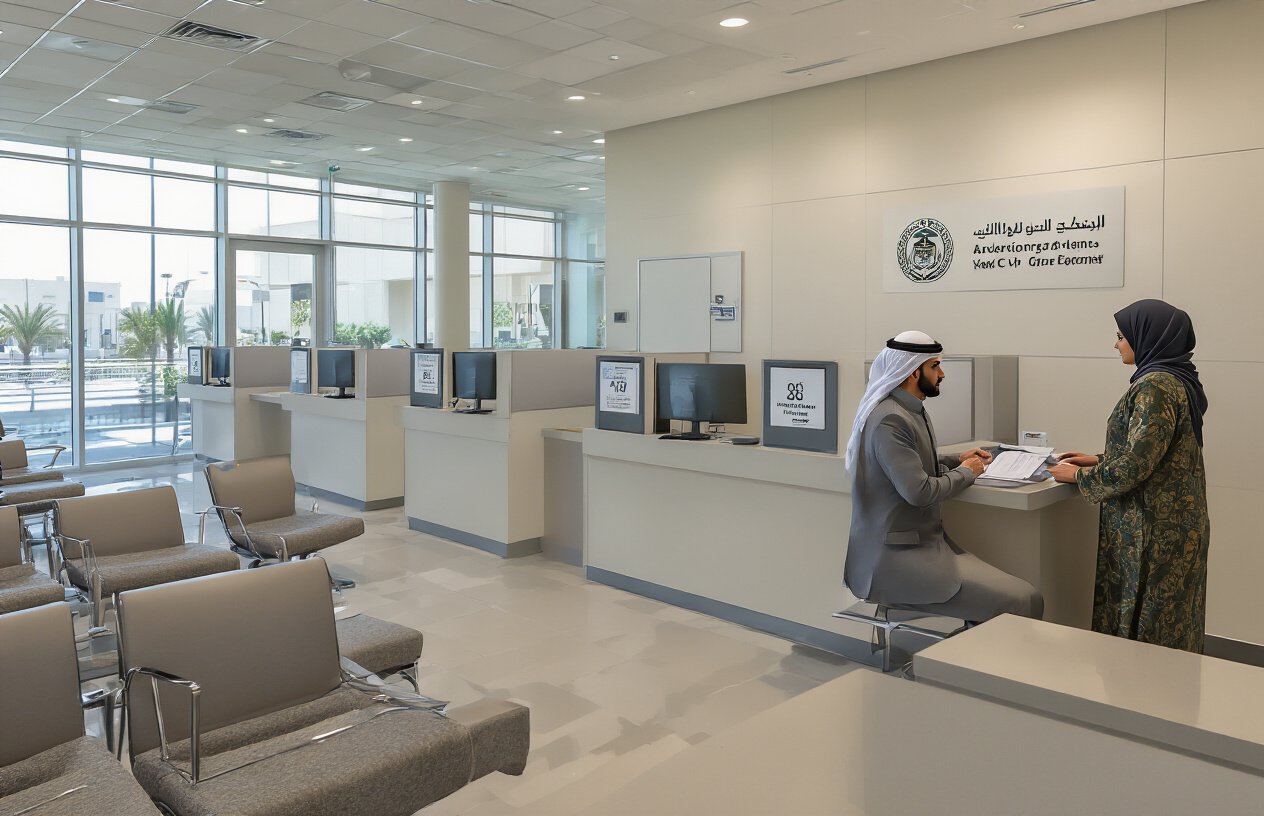
How to Register at Tadbeer Centers: Complete GCC Guide
Tadbeer Centers are your gateway to hiring domestic workers legally and safely across GCC countries. This complete guide is designed for expatriates, residents, and employers who need to register at these government-approved centers to hire housekeepers, nannies, drivers, or other household staff.
Navigating the registration process can feel overwhelming, especially when requirements vary between countries like UAE, Saudi Arabia, and Kuwait. We’ll break down everything you need to know, starting with understanding how Tadbeer Centers operate across different GCC nations and what documents you’ll need to gather before your visit.
You’ll also get a clear step-by-step walkthrough of the actual registration process, plus practical tips for selecting and hiring the right domestic worker for your household needs. By the end, you’ll know exactly how to register at Tadbeer Centers and access ongoing support services that make managing your domestic help straightforward and compliant with local laws.
Understanding Tadbeer Centers Across GCC Countries

What Tadbeer Centers Are and Their Purpose
Tadbeer centers serve as official government-regulated hubs for domestic worker recruitment and management across Gulf Cooperation Council (GCC) countries. These centers were established to create a standardized, transparent system that protects both employers and domestic workers while streamlining the hiring process.
The primary purpose of Tadbeer centers is to eliminate unscrupulous recruitment practices that previously plagued the domestic worker industry. They act as intermediaries between families seeking household help and qualified domestic workers, ensuring all parties understand their rights and responsibilities. These centers maintain strict standards for worker treatment, wages, and working conditions.
Each Tadbeer center operates under government oversight, which means they must comply with labor laws and regulations specific to their respective countries. This regulatory framework provides peace of mind for employers who want to hire domestic workers legally and ethically.
The centers also serve as ongoing support systems, handling contract renewals, resolving disputes, and managing worker transfers between employers when necessary. They maintain comprehensive databases of available workers, including their skills, experience levels, and background verification status.
Services Offered at Each GCC Location
Tadbeer centers across GCC countries provide comprehensive services, though specific offerings may vary by location and local regulations.
Core Services Available:
- Worker recruitment and matching services
- Background verification and health screenings
- Contract preparation and legal documentation
- Training programs for domestic workers
- 24/7 customer support and complaint resolution
- Worker replacement services during probation periods
- Visa processing assistance
- Insurance coverage arrangements
UAE Tadbeer Centers offer advanced digital platforms where employers can browse worker profiles online, schedule interviews via video calls, and track application status in real-time. They provide specialized training programs for different types of domestic work, including elderly care, childcare, and general housekeeping.
Saudi Arabia’s centers focus heavily on cultural orientation programs, ensuring workers understand local customs and religious practices. They offer extended trial periods and comprehensive insurance packages that cover medical emergencies and repatriation costs.
Qatar and Kuwait locations emphasize quick turnaround times, often completing the entire recruitment process within 2-3 weeks. They provide multilingual support staff and offer flexible payment plans for employer fees.
Bahrain and Oman centers specialize in matching workers with specific skill sets to employer requirements, offering detailed assessments of cooking abilities, language proficiency, and childcare experience.
Differences Between Country-Specific Requirements
Each GCC country has unique requirements and procedures when registering with Tadbeer centers, reflecting local labor laws and cultural preferences.
| Country | Registration Fee Range | Required Documents | Processing Time | Special Requirements |
|---|---|---|---|---|
| UAE | AED 2,000-5,000 | Emirates ID, Salary Certificate, Housing Contract | 7-14 days | Employer must earn minimum AED 25,000/month |
| Saudi Arabia | SAR 3,000-7,000 | Iqama, Bank Statements, Property Documents | 10-21 days | Saudi nationals get priority processing |
| Qatar | QAR 2,500-6,000 | QID, Employment Letter, Utility Bills | 5-10 days | Must demonstrate accommodation standards |
| Kuwait | KWD 500-1,200 | Civil ID, Salary Slip, Rental Agreement | 14-28 days | Requires police clearance certificate |
| Bahrain | BHD 400-800 | CPR, Work Permit, Bank Statement | 7-14 days | Employer interview required |
| Oman | OMR 300-600 | Resident Card, Income Proof, Tenancy Contract | 10-15 days | Health insurance mandatory |
Documentation varies significantly between countries. UAE requires comprehensive financial documentation, while Saudi Arabia focuses more on accommodation suitability. Qatar has strict housing standards that must be verified before registration approval.
Income thresholds differ substantially across the region. UAE has the highest minimum income requirement, while Oman and Bahrain have more flexible financial criteria. Some countries consider household income rather than individual earnings.
Benefits of Using Tadbeer Centers for Domestic Workers
Using official Tadbeer centers provides significant advantages over private recruitment agencies or informal hiring methods.
Legal Protection and Compliance
Tadbeer centers ensure all employment contracts comply with local labor laws, protecting employers from potential legal issues. They handle visa processing correctly, reducing the risk of immigration violations that could result in fines or deportation orders.
Quality Assurance
Workers recruited through Tadbeer centers undergo thorough background checks, health screenings, and skill assessments. This vetting process significantly reduces the risk of hiring unsuitable candidates or individuals with criminal backgrounds.
Ongoing Support System
Unlike private agencies that often disappear after placement, Tadbeer centers provide continuous support throughout the employment period. They handle worker complaints, mediate disputes, and facilitate smooth transitions when employment ends.
Transparent Pricing
Government regulation ensures standardized, transparent pricing without hidden fees. Employers know exactly what they’re paying for, and workers understand their salary and benefits from the start.
Replacement Guarantees
Most Tadbeer centers offer replacement services if the initial worker placement doesn’t work out during the probation period. This reduces financial risk for employers and ensures better matching between workers and families.
Cultural Training
Workers receive comprehensive orientation about local customs, religious practices, and cultural expectations, leading to smoother integration into households and fewer misunderstandings.
Insurance Coverage
Tadbeer centers typically include comprehensive insurance packages covering medical emergencies, accidents, and repatriation costs, providing financial protection for both parties.
Essential Documents and Requirements for Registration

Mandatory Identity Documents for Employers
Getting your identity documents ready is the first crucial step when registering at any Tadbeer center across GCC countries. You’ll need to bring original copies along with photocopies of all required documents to avoid multiple trips.
Your national ID card or passport serves as the primary identification document. For UAE residents, the Emirates ID is mandatory, while Saudi Arabia requires the national ID (Hawiya). Qatar, Kuwait, Oman, and Bahrain each have their specific national identification requirements that must be current and valid.
A valid residence visa is essential for expatriate employers. This document proves your legal status in the country and your right to hire domestic workers. Make sure your visa has at least six months remaining before expiration, as some centers won’t process applications for visors nearing renewal.
Family book or marriage certificate becomes necessary when hiring domestic help for family purposes. Single employers may need additional documentation explaining their household composition and the reason for requiring domestic assistance.
Power of attorney documents are required if someone else is handling the registration process on your behalf. This legal document must be attested and translated into the local language where applicable.
Property and Residence Verification Papers
Your housing situation needs thorough documentation to prove you can legally accommodate a domestic worker. The type of residence verification varies depending on whether you own or rent your property.
Property ownership documents include the title deed (Sanad) or property registration papers. These documents must clearly show you as the legal owner and should be recent copies from the relevant government authority. Some centers require these documents to be attested by the municipality or housing department.
Tenancy contracts are mandatory for renters and must be registered with local authorities. The contract should specify the property details, rental amount, and lease duration. Most importantly, it should allow for domestic worker accommodation or explicitly state that subletting to employees is permitted.
Electricity and water bills from the past three months serve as proof of residence. These utility bills confirm that you actually live at the declared address and maintain the property in good standing. Some centers accept online bill statements, while others require printed versions from official providers.
No Objection Certificate (NOC) from landlords is often required for renters. This document confirms that your landlord permits you to house domestic workers in the rented property. The NOC should be on official letterhead and signed by the property owner.
Income and Employment Proof Requirements
Financial stability is a key factor in domestic worker sponsorship, so prepare comprehensive income documentation. Your ability to pay salaries, provide accommodation, and cover medical expenses needs clear verification.
Salary certificates from your employer must be recent, typically not older than three months. The certificate should include your job title, monthly salary, employment start date, and company contact information. Government employees might need additional documentation from their respective ministries or departments.
Bank statements covering the last six months provide a clear picture of your financial stability. These statements should show regular salary deposits, sufficient account balance, and responsible financial management. Some centers require minimum balance thresholds, which vary by country and worker category.
Employment contracts help verify job security and income consistency. Your contract should clearly state salary details, employment duration, and benefits. Freelancers or business owners need different documentation, including trade licenses and business registration papers.
Tax returns or income declarations may be requested in certain GCC countries. These documents provide additional verification of your reported income and tax compliance status.
Health and Background Check Documentation
Clean health and security clearances protect both employers and domestic workers, making these documents non-negotiable for registration.
Medical fitness certificates must be obtained from approved healthcare facilities. The medical exam typically includes basic health screening, communicable disease testing, and mental health evaluation. Certificates are usually valid for specific periods, so check expiration dates carefully.
Police clearance certificates verify your criminal background status. These documents must be obtained from your home country and the GCC country where you reside. Processing times vary significantly, so start this process early. Certificates older than six months are typically not accepted.
Security clearance from relevant authorities might be required for certain professions or nationalities. Government employees, military personnel, or those working in sensitive sectors often need additional security documentation from their employers or security agencies.
Attestation and translation services are necessary for foreign documents. All certificates and clearances issued outside the GCC must be attested by the issuing country’s foreign ministry and then by the GCC country’s embassy or consulate. Arabic translation by certified translators is mandatory for non-Arabic documents.
Step-by-Step Registration Process at Tadbeer Centers

Online Pre-Registration and Account Creation
Most Tadbeer centers across the GCC have moved to digital-first approaches, making online pre-registration your starting point. Visit your country’s official Tadbeer portal and create your personal account using your Emirates ID, Qatar ID, or equivalent national identification. The registration form asks for basic personal details, contact information, and employment status.
Upload clear photos of required documents during account creation – this speeds up the verification process significantly. The system performs initial document checks automatically, flagging any issues early. You’ll receive login credentials via SMS and email, so keep both accessible.
Some centers require you to specify your domestic worker preferences during pre-registration, including nationality, experience level, and specific skills. This information helps match you with suitable candidates faster.
Booking Your Appointment at the Nearest Center
After successful pre-registration, the appointment booking system becomes available in your account dashboard. Choose from available time slots based on your location and preferred center. Peak hours typically fall between 9 AM and 2 PM, so early morning or late afternoon appointments often have better availability.
The booking system shows real-time availability across multiple centers in your area. Select your preferred date and time, then confirm your appointment via the confirmation email or SMS. Most centers allow appointment modifications up to 24 hours in advance through the online portal.
Emergency or urgent applications may qualify for same-day appointments, depending on center capacity and your specific circumstances.
Document Submission and Verification Process
Arrive at your appointed center 15 minutes early with both original documents and photocopies. The verification officer reviews each document against your online pre-registration data. Common verification points include passport validity, visa status, salary certificates, and housing contracts.
The biometric data collection happens during this stage – fingerprints, digital photographs, and signature samples. Staff members check document authenticity using specialized scanners and verification systems. Any discrepancies between submitted documents and pre-registration information get addressed immediately.
Missing or incorrect documents require rescheduling your appointment, so double-check everything beforehand. The verification process typically takes 20-30 minutes for complete applications.
Payment of Fees and Service Charges
Tadbeer centers accept multiple payment methods including cash, credit cards, and digital payment platforms. Registration fees vary by country and service type, ranging from AED 300 to AED 800 in the UAE, with similar equivalent amounts in other GCC countries.
Payment covers your registration, initial background checks, and access to the domestic worker database. Additional services like expedited processing or premium matching carry separate charges. Request a detailed receipt showing all fee breakdowns for your records.
Some centers offer installment payment plans for comprehensive packages that include worker training and replacement guarantees. These plans typically require a down payment of 40-50% of the total cost.
Receiving Your Registration Confirmation
Your registration confirmation arrives via email within 2-3 business days after successful payment and document verification. The confirmation includes your unique Tadbeer registration number, which you’ll use for all future interactions with the center.
The confirmation email contains login credentials for the domestic worker selection portal, where you can browse available candidates. Your registration remains valid for 12 months from the issue date, allowing flexibility in your hiring timeline.
Keep physical and digital copies of your confirmation – you’ll need these for visa applications, contract signings, and worker arrival procedures. Some centers provide mobile apps where you can access your registration status and updates in real-time.
Selecting and Hiring Domestic Workers Through Tadbeer

Browsing Available Worker Profiles and Skills
Your Tadbeer portal gives you access to detailed profiles of vetted domestic workers, complete with photos, experience summaries, and skill certifications. The search function lets you filter candidates by nationality, language abilities, specific skills like cooking or elderly care, and years of experience. Each profile includes previous employer ratings and specialized training certificates.
Most profiles feature video introductions where workers demonstrate basic language skills and discuss their experience. Pay attention to workers who have completed Tadbeer’s standardized training programs in areas like child care, housekeeping techniques, or cooking specific cuisines. The system also shows availability dates, so you can plan your hiring timeline accordingly.
The rating system displays feedback from previous employers, covering areas like reliability, communication, and work quality. Look for consistent positive feedback across multiple placements rather than focusing solely on perfect scores. Workers with diverse experience across different household types often adapt better to new environments.
Conducting Interviews and Background Checks
Schedule video interviews through the Tadbeer platform to assess communication skills and personality fit. Prepare specific questions about daily routines, emergency situations, and household preferences. Ask about experience with pets, dietary restrictions, or special needs if relevant to your family situation.
Tadbeer conducts comprehensive background verification including criminal record checks, employment history validation, and health screenings. Review these documents carefully, noting any gaps in employment or health concerns that might affect job performance. The medical reports include recent TB tests, general health assessments, and vaccination records.
During interviews, observe body language and responsiveness to questions. Workers who ask thoughtful questions about your family’s needs and household routines often demonstrate genuine interest and professionalism. Don’t hesitate to request a second interview if you need more time to evaluate compatibility.
Finalizing Contract Terms and Salary Agreements
Tadbeer provides standardized contract templates that comply with local labor laws while allowing customization for specific arrangements. Review salary ranges for your chosen worker category and location, keeping in mind that experienced workers with specialized skills command higher wages.
The contract covers working hours, weekly rest days, overtime compensation, and annual leave entitlements. Specify household duties clearly, including cleaning schedules, cooking responsibilities, and any childcare or eldercare tasks. Include provisions for religious observances and cultural dietary requirements.
Discuss accommodation arrangements, including room specifications, shared spaces, and privacy expectations. Address phone and internet usage policies, visitor permissions, and emergency contact procedures. The contract should also outline grounds for termination, notice periods, and end-of-service benefits to protect both parties.
Payment methods through Tadbeer’s secure system ensure compliance with wage regulations and provide transaction records for both employer and worker. Consider including performance bonuses or annual increments to encourage long-term commitment and job satisfaction.
Post-Registration Services and Ongoing Support

Worker Replacement and Transfer Procedures
When your domestic worker needs to be replaced or transferred, Tadbeer centers provide streamlined procedures to ensure minimal disruption to your household operations. The replacement process typically takes 2-7 working days, depending on the availability of suitable candidates matching your specific requirements.
To initiate a worker replacement, you’ll need to visit your registered Tadbeer center with your original contract and valid Emirates ID. The center will document the reason for replacement – whether due to incompatibility, worker resignation, or performance issues. A replacement fee ranging from AED 200-500 applies, varying by emirate and specific circumstances.
Transfer procedures allow you to move your domestic worker to a different location or family member within the same visa sponsorship. This process requires approval from both the current and receiving households, along with updated accommodation details and contact information.
Required Documents for Replacement/Transfer:
- Original employment contract
- Emirates ID (sponsor and worker)
- Passport copies
- No Objection Certificate (for transfers)
- Medical fitness certificate (if required)
Resolving Disputes and Complaint Handling
Tadbeer centers maintain dedicated complaint resolution departments to address conflicts between employers and domestic workers. The dispute resolution process follows a structured approach designed to protect the rights of both parties while maintaining fair employment practices.
Common disputes include salary disagreements, working hour conflicts, accommodation issues, and contract violations. When filing a complaint, you’ll meet with a trained mediator who speaks both Arabic and the worker’s native language to ensure clear communication throughout the process.
The resolution timeline typically spans 3-10 working days, depending on the complexity of the issue. Tadbeer centers maintain detailed records of all complaints and their outcomes to improve service quality and prevent recurring problems.
Complaint Filing Process:
- Submit written complaint with supporting evidence
- Schedule mediation session within 48 hours
- Attend joint meeting with worker and mediator
- Receive documented resolution agreement
- Follow-up consultation after 7 days
Renewal Process for Continued Services
Contract renewals through Tadbeer centers require advance planning, typically beginning 30-60 days before your current agreement expires. The renewal process ensures continuous legal employment status while updating terms based on current regulations and wage standards.
During renewal, you can modify working arrangements, adjust salary structures, or change specific job responsibilities. Tadbeer centers review performance evaluations and conduct brief interviews with both parties to confirm mutual satisfaction before processing the extension.
Renewal fees range from AED 300-800 depending on contract duration and services included. Two-year contracts often provide better value compared to annual renewals, with many centers offering discounted rates for longer commitments.
Renewal Requirements:
- Current contract and amendments
- Updated medical certificates
- Proof of salary payments
- Accommodation inspection report
- Performance evaluation forms
Additional Training and Skill Development Options
Tadbeer centers collaborate with certified training institutes to offer skill enhancement programs for domestic workers. These courses cover specialized areas like elderly care, child development, cooking techniques, and household management systems.
Popular training modules include first aid certification, basic computer skills, language improvement classes, and cultural orientation programs. Most courses run for 1-3 weeks with flexible scheduling to accommodate working arrangements.
Employers can sponsor workers for advanced training programs, often leading to improved service quality and job satisfaction. Training costs typically range from AED 500-2,000 per course, with some centers offering group discounts for multiple enrollees.
The training certificates issued are recognized across GCC countries, adding value to workers’ professional profiles while ensuring employers receive enhanced services. Many families report significant improvements in household management and communication after their workers complete these programs.
Available Training Categories:
- Healthcare and elderly assistance
- Childcare and educational support
- Culinary arts and nutrition
- Technology and household appliances
- Communication and language skills

Getting registered with Tadbeer Centers across the GCC doesn’t have to be complicated when you know what to expect. From gathering the right documents to completing the registration process and selecting your ideal domestic worker, these centers offer a streamlined approach to finding reliable household help. The key is being prepared with all required paperwork and understanding each step before you start.
Take advantage of the ongoing support services these centers provide even after you’ve hired someone. They’re designed to make the entire experience smoother and give you peace of mind. If you’re ready to find trusted domestic help through official channels, visit your nearest Tadbeer Center with your documents in hand and start the registration process today.
img{
width:100%;
}
table, td, th {
border: 1px solid;
}
table {
width: 100%;
border-collapse: collapse;
}












